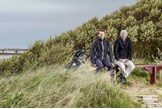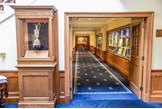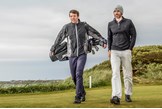The Open 2016: BBC’s Andrew Cotter knows Royal Troon better than anyone
Published: Last updated:
Andrew Cotter will commentate on the Open for the BBC. His brother, Colin, has been a Troon caddie for 30 years. Both are members here. Both have single-figure handicaps here. And both know these links better than just about anyone.
The Cotter brothers know Royal Troon like the back of their hands. They grew up here. It’s in their blood. BBC sports commentator Andrew and Troon caddie Colin were knee-high to a grasshopper when they first picked up a club at the historic links, following in the footsteps of their father, grandfather and great grandfather. What they don’t know about the place isn’t worth knowing.
“I’ve been a member on and off for 35 years, and I’ve played the Old Course hundreds of times,” says three handicapper Andrew. “But Colin caddies here four or five times a week, two rounds a day between April and October, so he will have gone round this course more than virtually anybody.”
As the two sit down with TG inside Troon’s historic clubhouse, we start the conversation by asking about their longstanding family connection to the course…
Andrew: Firstly, dad (Tom) is still a member and very occasionally plays though I hope he won’t mind me saying he’s the worst golfer.
Colin: We grew up thinking it was normal to play a putter from 100 yards in because he didn’t want to shank it or go into a bunker. That said, he once won the winter foursomes which he was incredibly proud about. But when he played regularly he just used to will the ball round…
Andrew: Uncle Douglas on the other hand was a good player. He’d be playing here most days. Grandfather Jimmy and great grandfather Tom Millar were also members with our great grandfather moving to Troon in 1909 when he was the head of the then shipping yard.
Colin: Our grandfather was the minister of the parish church and he was not only a Troon member, but also played rugby for Scotland, which considering his line of work was quite something.
Andrew: So that’s probably where the Cotter sporting genes come from – golf and rugby were always the two big sports in the family growing up. We started out on the nine-hole Craigend, the children’s course as it was then, at Troon. We played here as juniors, but I have to say the club has improved things hugely on that score. In our day, the juniors didn’t have any standing so we couldn’t play the Old Course, and didn’t until I entered amateur tournaments at 16 or 17. So I joined Kilmarnock Barassie GC and joined here as an adult again. Now it’s much, much better… juniors can use the practice facilities and can play the course.
Colin: I remember getting a 7-iron for my fourth birthday, which meant that Andrew could use a cut-down version of what I started with. He’d have just turned three and we both first picked up a club aged two!
Andrew: We’ve got an older brother (Steven) who is also a Troon member. He’s got the ability of my father and again – I hope he doesn’t mind me saying this – he’s a terrible golfer.

Presumably, caddying at Royal Troon was a good way to earn some extra money as when you were little?
Colin: I started caddying at 14 and this is my 31st year. At the time it was £10 plus tip. My school pals kept asking ‘how much!?’ Having grown up with golf, it was something I obviously enjoyed. Because you’ve played golf you instantly assume you’re a good caddie, but it’s only a few years later you realise how rubbish you were. It was at least 15 years before I started thinking I was actually forgetting more than I was learning. It’s easy to be a decent caddie, but it’s very hard to become a consistently good caddie for so many different types of people.
Andrew: There’s nobody who knows more about the history of the course, its developments, the architecture and the club than Colin, so he is the sort of tour guide as well.
Colin: A rough guesstimate I’d say I’ve done about 4,000 rounds. Andrew: That’s a lot of walking! Colin caddied in the last couple of Opens here owing to guys qualifying at the last minute and needing somebody on their bag.
Colin: Unfortunately it’s unlikely to happen this year, but if somebody needs a caddie, hopefully I’ll be able to step in. In 1997, I carried the bag of John Kernohan, who was the Singapore Open champion at the time. He made the cut and it was a joy to be carrying the bag on
the final day at The Open. I knew it was a big day because when we were coming down the 18th on Sunday – he pulled a camera out and asked me to take photos of him! In 2004 I was on the bag of American Spike McRoy, who shot level par in the first round and was doing nicely. But he stayed in the busiest hotel in Troon and I knew just looking at him he wasn’t right owing to lack of sleep. Sure enough, he
shot a 77, missing the cut by three.
Andrew: He’s also carried on tour for Colin Montgomerie at a time when Monty was regularly switching caddies.
Colin: Because I’d caddied for him before and he knew the family, I got the job and we started off working in Germany and it lasted a couple of months. Caddying for Monty is a unique challenge: he’s two different people. He’s a fantastic guy, but on the golf course he has
his way of doing things and it’s very hard topick up on that and you can see why he was having a turnover of caddies. But I did enjoy the experience and the other thing it taught me was that I didn’t want to be on the Tour full-time.
So how would you describe Troon to someone who’s never been here?
Andrew: Troon is a great place to learn to play golf and if you can play here, you can play anywhere. Get used to playing in a 30mph plus wind and you’ll be fine! My usual shot trajectory four feet off the ground helps. One of the Old course’s biggest defences are the small greens, but then again they are pretty flat so once players are on the putting surfaces they’re pretty easy to contend with.
Colin: It’s obvious I know, but the other key is to stay out of the bunkers.
Andrew: That’s right. Todd Hamilton only found one last time, taking full advantage of Colin’s own course guide!
Colin: Actually, when Justin Leonard won in 1997 he didn’t find one, either, so the last two winners between them have only found one bunker which is quite an achievement! Visually the bunkers are not as threatening as St Andrews, Muirfi eld or Carnoustie, but they’re so small you can end up with all kinds of strange stances in them. Also, I don’t think there are many courses where the bunkering is so tight… tight into the greens that is. Then the premium is put on hitting fairways, so you can get the required spin, but you’ll struggle to get spin if you fail to keep it on the short stuff. There are only one or two fairway bunkers you can think you can get 100 yards out of. They’re just there to cost you. End of story.

Is Troon a classic nine out and nine back links course?
Andrew: People say it’s straight out, straight back. It’s not at all. It’s six holes out, look for six and then back for six. The six middle holes go around in various directions and that’s really the interesting part of the course. The wind is always a factor and usually would be out of the west and down and off your right shoulder. In 1989, Greg Norman birdied the first six holes in the final round, but that’s not unusual as you prepare to face the crunch middle section, the beast of the course. Then it’s a brutal back nine.
Colin: There is an argument though that says if the wind is against on the front nine it actually becomes a harder course because the back nine is tough enough to look after itself with the extra length and small greens. Ten, 11 and 12 are so tight, with gorse everywhere.
Andrew: If you stand on the extraordinary championship tee on the 11th and take a photo you’ll see nothing but gorse, though they have slightly opened it out on the right-hand side. The 16th is really the only respite. Like all links courses, if it’s not windy there’ll be some very good scores. In the 2012 Amateur Championship here oneof the Swedish players shot 65.
Colin: Is it a tough course? Yes. But if you’re on your game, can you score well? Definitely. As we’ve already said, the greens aren’t that sloped. If you’re hitting greens in regulation you can score and that goes for the higher handicapper, too. Keep it in play and you can surprise yourself.
Andrew: It does identify good players though and obviously you want the big names to come to the fore. If you look at
the last leaderboard beyond Todd Hamilton you had the likes of Els, Tiger and Mickelson. I must also say that of all the Open rota courses there aren’t that many where you actually see the sea. Here, you tee off and you’re looking down on the beach. I’ve cursed this in the past because I’ve been on the beach off the first, though nowadays it’s OB. You stand on the 5th green and it’s just fantastic. It will be interesting to see what the rough is like because they’ve had a very cold spring so far and need some growing. Sometimes, historically, the R&A says how much rough they want and make that happen, but usually it’s totally down to the elements. They just leave it to nature to see whether the rough will grow and if it doesn’t, so be it.
Colin: They normally have the greens between 10-10.5 on the stimpmeter and they are great greens year in, year out. They’ll be fast enough, though they have it in their armoury to make them even faster and they could hit 11-plus if it’s really dry. Then the fairways can get spectacularly fast, putting a premium on good driving, giving players the ability to spin the ball, which they won’t get out of the rough.
When it’s wet, the course plays a bit longer, but it gets a bit easier to a certain extent though if the rough is very heavy that can have an impact as well.
Andrew: You can putt well here, you can be a bit more aggressive and because the greens are quite flat and benign, you can go for it.
Who’s going to win The Open?
● Andrew: Someone like a Zach Johnson, just because he can plot his way around as Justin Leonard did nearly 20 years ago. Also, look at the history and apart from Arthur Havers and Bobby Locke, all the winners have been American – which debugs the myth that Americans can’t play links courses.
● Colin: This is as true a links course as you’ll find. Sure, you still need to be hitting a good ball, but it’s more about controlling the drive to get on the right line.
● Andrew: I’d quite like to see someone like Rickie Fowler, the game needs somebody like him to do well. It could be Lee Westwood’s year at last. He’s someone who is so accurate and can carefully plot his way around and will be buoyed by his Masters performance.
-
 The Cotter brothers know Royal Troon like the back of their hands
The Cotter brothers know Royal Troon like the back of their hands
-
 There's nobody who knows more about the history of the course, its developments, the architecture and the club than Colin
There's nobody who knows more about the history of the course, its developments, the architecture and the club than Colin
-
 Andrew Cotter will commentate on the Open for the BBC. His brother, Colin, has been a Troon caddie for 30 years.
Andrew Cotter will commentate on the Open for the BBC. His brother, Colin, has been a Troon caddie for 30 years.
